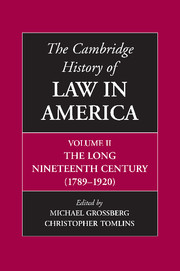Book contents
- Frontmatter
- 1 Law and the American State, from the Revolution to the Civil War: Institutional Growth and Structural Change
- 2 Legal Education and Legal Thought, 1790–1920
- 3 The Legal Profession: From the Revolution to the Civil War
- 4 The Courts, 1790–1920
- 5 Criminal Justice in the United States, 1790–1920: A Government of Laws or Men?
- 6 Citizenship And Immigration Law, 1800–1924: Resolutions Of Membership And Territory
- 7 Federal Policy, Western Movement, and Consequences for Indigenous People, 1790–1920
- 8 Marriage and Domestic Relations
- 9 Slavery, Anti-Slavery, and the Coming of the Civil War
- 10 The Civil War And Reconstruction
- 11 Law, Personhood, and Citizenship in the Long Nineteenth Century: the Borders of Belonging
- 12 Law in Popular Culture, 1790–1920: The People and the Law
- 13 Law and Religion, 1790–1920
- 14 Legal Innovation and Market Capitalism, 1790–1920
- 15 Innovations in Law and Technology, 1790–1920
- 16 The Laws of Industrial Organization, 1870–1920
- 17 The Military in American Legal History
- 18 The United States and International Affairs, 1789–1919
- 19 Politics, State-Building, and the Courts, 1870–1920
- Bibliographic Essays
- Notes on Contributors
- Index
- References
15 - Innovations in Law and Technology, 1790–1920
Published online by Cambridge University Press: 28 November 2008
- Frontmatter
- 1 Law and the American State, from the Revolution to the Civil War: Institutional Growth and Structural Change
- 2 Legal Education and Legal Thought, 1790–1920
- 3 The Legal Profession: From the Revolution to the Civil War
- 4 The Courts, 1790–1920
- 5 Criminal Justice in the United States, 1790–1920: A Government of Laws or Men?
- 6 Citizenship And Immigration Law, 1800–1924: Resolutions Of Membership And Territory
- 7 Federal Policy, Western Movement, and Consequences for Indigenous People, 1790–1920
- 8 Marriage and Domestic Relations
- 9 Slavery, Anti-Slavery, and the Coming of the Civil War
- 10 The Civil War And Reconstruction
- 11 Law, Personhood, and Citizenship in the Long Nineteenth Century: the Borders of Belonging
- 12 Law in Popular Culture, 1790–1920: The People and the Law
- 13 Law and Religion, 1790–1920
- 14 Legal Innovation and Market Capitalism, 1790–1920
- 15 Innovations in Law and Technology, 1790–1920
- 16 The Laws of Industrial Organization, 1870–1920
- 17 The Military in American Legal History
- 18 The United States and International Affairs, 1789–1919
- 19 Politics, State-Building, and the Courts, 1870–1920
- Bibliographic Essays
- Notes on Contributors
- Index
- References
Summary
Law and technology are both critical for understanding the evolution of American society. As such prominent commentators as Thomas Paine and Alexis de Tocqueville have pointed out, U.S. policy has always been distinguished by the central role of law and the judiciary. Meanwhile, its citizens stand out for their innovativeness and willingness to adopt new technologies, to such an extent that some have even characterized the United States as a “republic of technology.” This favorable view of invention and innovation was matched by the readiness of the judiciary to accommodate the radical transformations caused by innovations. Some modern observers contend, however, that technology in the twenty-first century is so radically different from previous experience that technological change today threatens the viability of the conventional legal system as a means of regulation or mediation.
The notion that our own era is unique displays a limited appreciation of the cumulative impact of such innovations as the telegraph, steam engine, railroad, radio, hydroelectric power and commercial air travel on American society in the nineteenth and early twentieth centuries. Unprecedented technical progress during that period brought about discrete and measurable changes in the lives, lifestyles, and livelihoods of Americans that, arguably, exceed those of our own time. Less dramatic advances in knowledge and their applications also significantly promoted social welfare. For example, the diffusion of information about hygiene and common medical technologies among households extended life expectancies and improved the standard of living. Technological innovations also affected the scope and nature of the law.
- Type
- Chapter
- Information
- The Cambridge History of Law in America , pp. 483 - 530Publisher: Cambridge University PressPrint publication year: 2008
References
- 2
- Cited by



